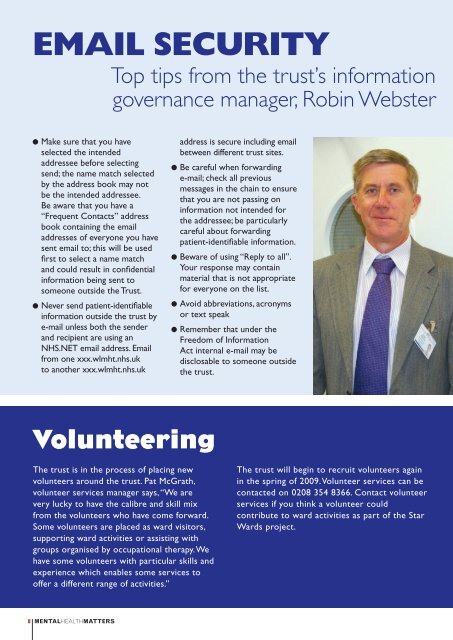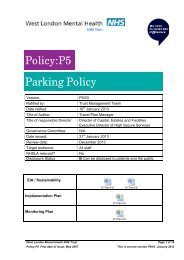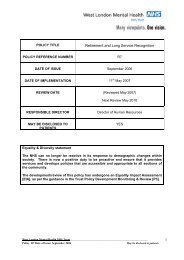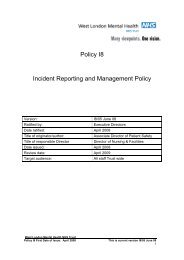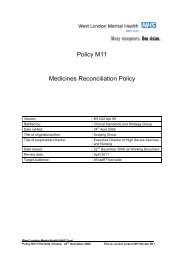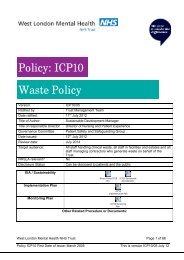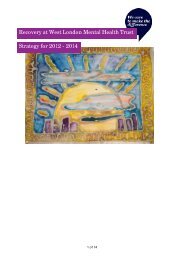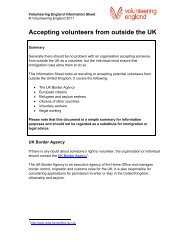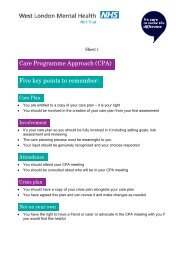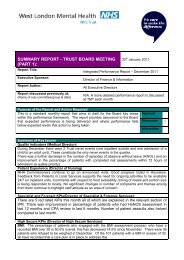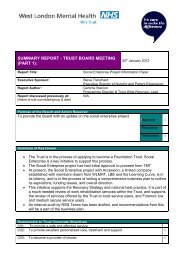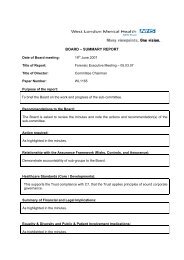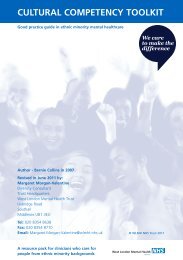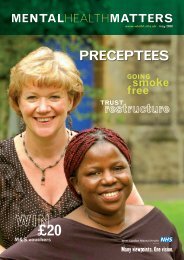children - West London Mental Health NHS Trust
children - West London Mental Health NHS Trust
children - West London Mental Health NHS Trust
You also want an ePaper? Increase the reach of your titles
YUMPU automatically turns print PDFs into web optimized ePapers that Google loves.
Email security<br />
Top tips from the trust’s information<br />
governance manager, Robin Webster<br />
• Make sure that you have<br />
selected the intended<br />
addressee before selecting<br />
send; the name match selected<br />
by the address book may not<br />
be the intended addressee.<br />
Be aware that you have a<br />
“Frequent Contacts” address<br />
book containing the email<br />
addresses of everyone you have<br />
sent email to; this will be used<br />
first to select a name match<br />
and could result in confidential<br />
information being sent to<br />
someone outside the <strong>Trust</strong>.<br />
• Never send patient-identifiable<br />
information outside the trust by<br />
e-mail unless both the sender<br />
and recipient are using an<br />
<strong>NHS</strong>.NET email address. Email<br />
from one xxx.wlmht.nhs.uk<br />
to another xxx.wlmht.nhs.uk<br />
Volunteering<br />
The trust is in the process of placing new<br />
volunteers around the trust. Pat McGrath,<br />
volunteer services manager says, “We are<br />
very lucky to have the calibre and skill mix<br />
from the volunteers who have come forward.<br />
Some volunteers are placed as ward visitors,<br />
supporting ward activities or assisting with<br />
groups organised by occupational therapy. We<br />
have some volunteers with particular skills and<br />
experience which enables some services to<br />
offer a different range of activities.”<br />
address is secure including email<br />
between different trust sites.<br />
• Be careful when forwarding<br />
e-mail; check all previous<br />
messages in the chain to ensure<br />
that you are not passing on<br />
information not intended for<br />
the addressee; be particularly<br />
careful about forwarding<br />
patient-identifiable information.<br />
• Beware of using “Reply to all”.<br />
Your response may contain<br />
material that is not appropriate<br />
for everyone on the list.<br />
• Avoid abbreviations, acronyms<br />
or text speak<br />
• Remember that under the<br />
Freedom of Information<br />
Act internal e-mail may be<br />
disclosable to someone outside<br />
the trust.<br />
The trust will begin to recruit volunteers again<br />
in the spring of 2009. Volunteer services can be<br />
contacted on 0208 354 8366. Contact volunteer<br />
services if you think a volunteer could<br />
contribute to ward activities as part of the Star<br />
Wards project.<br />
THE HOT SEAT<br />
Dr Nick Broughton<br />
Clinical director for the <strong>West</strong> <strong>London</strong> forensic<br />
service delivery unit and consultant forensic<br />
psychiatrist at Her Majesty’s Young Offenders<br />
Institute, Feltham.<br />
Responsibilities at the trust?<br />
Together with Andy Weir I am responsible for<br />
managing the west <strong>London</strong> forensic services which<br />
include women’s services, forensic adolescent services<br />
and men’s secure services on the Ealing site. In addition<br />
I am currently covering a colleague’s maternity leave<br />
and am working at Feltham, both on the inpatient unit<br />
and with the prison’s CMHT.<br />
Career history?<br />
I completed my medical school training at Cambridge<br />
University and St Thomas’ Hospital in <strong>London</strong>. I then<br />
joined the St Mary’s psychiatric training scheme and had a<br />
number of senior house officer jobs in north west <strong>London</strong><br />
(including at this trust) and in Hertfordshire. I came to<br />
work at WLMHT in 1997 initially as a clinical research<br />
fellow, then as a senior registrar and was appointed a<br />
consultant in 2000.<br />
What did you want to be when you were at school?<br />
I wanted to be a doctor from a very young age but at times<br />
also had ambitions to become a marine biologist.<br />
Why did you decide to specialise in psychiatry?<br />
I was inspired during my psychiatry placements at<br />
medical school. I really enjoyed spending time with<br />
patients and getting to know them. I also realised that<br />
what clinical skills I had centred around talking and<br />
listening to patients.<br />
Favourite part of the job?<br />
Spending time with patients and seeing them progress.<br />
I also really enjoy working with colleagues from<br />
all disciplines and developing strong and effective<br />
multidisciplinary teams.<br />
Least favourite part of the job?<br />
Time spent in front of my computer particularly receiving<br />
and responding to emails.<br />
What is your leadership style?<br />
Hopefully I am approachable and inclusive. By this I mean<br />
that I like to involve colleagues in decision making. I try<br />
to empower and enable colleagues to perform their jobs<br />
as effectively as possible and attempt to inspire people and<br />
make them believe that their goals are achievable.<br />
Describe yourself in four words?<br />
Passionate, compassionate, thorough and calm (most of<br />
the time).<br />
What three things would you put in your Room 101?<br />
Goats cheese, my inbox and litter.<br />
What would improve your working life at the trust?<br />
More time, less paperwork and better accommodation for<br />
the patients in the Tony Hillis wing.<br />
What are you most proud of that you have done at<br />
WLMHT?<br />
It is early days in terms of my managerial career, but I would<br />
like to think that I am helping to improve relationships<br />
between clinicians and managers. I am also proud of the<br />
care that I have delivered to my patients especially those<br />
who have been discharged and gone on to lead meaningful<br />
lives in the community, and I would like to think that I have<br />
helped give my patients a sense of hope.<br />
What do you enjoy doing when you are not at work?<br />
Spending time with my family, playing golf and skiing. I<br />
am also a passionate Manchester United fan and one of<br />
the highlights of last year was seeing them beat Barcelona<br />
in the semi-finals of the Champions League.<br />
Best piece of advice you have been given?<br />
The first consultant psychiatrist I worked for at medical<br />
school told me that to become a good psychiatrist you<br />
should experience as much of life as possible. That way<br />
you will be better able to understand your patients.<br />
8 MENTALHEALTHMATTERS MENTALHEALTHMATTERS 9


